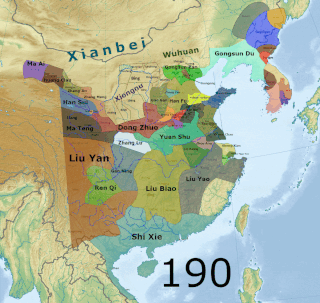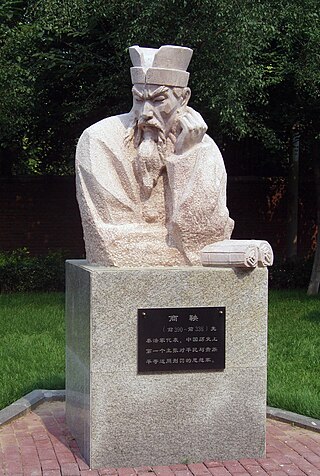Related Research Articles

The history of China spans several millennia across a wide geographical area. Each region now considered part of the Chinese world has experienced periods of unity, fracture, prosperity, and strife. Chinese civilization first emerged in the Yellow River valley, which along with the Yangtze basin constitutes the geographic core of the Chinese cultural sphere. China maintains a rich diversity of ethnic and linguistic people groups. The traditional lens for viewing Chinese history is the dynastic cycle: imperial dynasties rise and fall, and are ascribed certain achievements. Throughout pervades the narrative that Chinese civilization can be traced as an unbroken thread many thousands of years into the past, making it one of the cradles of civilization. At various times, states representative of a dominant Chinese culture have directly controlled areas stretching as far west as the Tian Shan, the Tarim Basin, and the Himalayas, as far north as the Sayan Mountains, and as far south as the delta of the Red River.

Hans Christian Andersen was a Danish author. Although a prolific writer of plays, travelogues, novels, and poems, he is best remembered for his literary fairy tales.

The Qing dynasty, officially the Great Qing, was a Manchu-led imperial dynasty of China and the last imperial dynasty in Chinese history. The dynasty, proclaimed in Shenyang in 1636, seized control of Beijing in 1644, which is considered the start of the dynasty's rule. The dynasty lasted until 1912, when it was overthrown in the Xinhai Revolution. In Chinese historiography, the Qing dynasty was preceded by the Ming dynasty and succeeded by the Republic of China. The multi-ethnic Qing dynasty assembled the territorial base for modern China. It was the largest imperial dynasty in the history of China and in 1790 the fourth-largest empire in world history in terms of territorial size. With over 426 million citizens in 1907, it was the most populous country in the world at the time.

The Three Kingdoms of Cao Wei, Shu Han, and Eastern Wu dominated China from 220 to 280 AD following the end of the Han dynasty. This period was preceded by the Eastern Han dynasty and followed by the Western Jin dynasty. Academically, the periodisation begins with the establishment of Cao Wei in 220 and ends with the conquest of Wu by Jin in 280. The period immediately preceding the Three Kingdoms from 184 to 220 was marked by chaotic infighting among warlords across China as Han authority collapsed. The period from 220 to 263 was marked by a comparatively stable arrangement between Cao Wei, Shu Han, and Eastern Wu. This stability broke down with the conquest of Shu by Wei in 263, followed by the usurpation of Cao Wei by Jin in 266, and ultimately the conquest of Wu by Jin in 280.

The Han dynasty was an imperial dynasty of China, established by Liu Bang and ruled by the House of Liu. The dynasty was preceded by the short-lived Qin dynasty (221–206 BC) and a warring interregnum known as the Chu–Han contention (206–202 BC), and it was succeeded by the Three Kingdoms period (220–280 AD). The dynasty was briefly interrupted by the Xin dynasty (9–23 AD) established by the usurping regent Wang Mang, and is thus separated into two periods—the Western Han and the Eastern Han (25–220 AD). Spanning over four centuries, the Han dynasty is considered a golden age in Chinese history, and had a permanent impact on Chinese identity in later periods. The majority ethnic group of modern China refer to themselves as the "Han people" or "Han Chinese". The spoken Sinitic language and written Chinese are referred to respectively as the "Han language" and "Han characters".

Manchuria is a term that refers to a region in Northeast Asia encompassing the entirety of present-day Northeast China, and historically parts of the modern-day Russian Far East, often referred to as Outer Manchuria. Its definition may refer to varying geographical extents as follows: the Chinese provinces of Heilongjiang, Jilin, and Liaoning but broadly also including the eastern Inner Mongolian prefectures of Hulunbuir, Hinggan, Tongliao, and Chifeng, collectively known as Northeast China; the aforementioned regions plus the homelands of ancient Jurchen and their descendant Manchus, parts of these region were ceded to the Russian Empire by the Manchu-led Qing dynasty during the Amur Annexation of 1858–1860, which include present-day Amur Oblast, Primorsky Krai, the Jewish Autonomous Oblast, the southern part of Khabarovsk Krai, and the eastern edge of Zabaykalsky Krai, collectively known as the Outer Manchuria or Russian Manchuria.

The Jin dynasty, officially known as the Great Jin, was an imperial dynasty of China that existed between 1115 and 1234. Because the Wanyan clan that founded the dynasty were of Jurchen descent, it is also sometimes called the Jurchen dynasty or the Jurchen Jin.
The Xiongnu were a tribal confederation of nomadic peoples who, according to ancient Chinese sources, inhabited the eastern Eurasian Steppe from the 3rd century BC to the late 1st century AD. Modu Chanyu, the supreme leader after 209 BC, founded the Xiongnu Empire.

The Tokugawa shogunate, also known as the Edo shogunate, was the military government of Japan during the Edo period from 1603 to 1868.
The ManchusA are a Tungusic East Asian ethnic group native to Manchuria in Northeast Asia. They are an officially recognized ethnic minority in China and the people from whom Manchuria derives its name. The Later Jin (1616–1636) and Qing (1636–1912) dynasties of China were established and ruled by the Manchus, who are descended from the Jurchen people who earlier established the Jin dynasty (1115–1234) in northern China. Manchus form the largest branch of the Tungusic peoples and are distributed throughout China, forming the fourth largest ethnic group in the country. They are found in 31 Chinese provincial regions. Among them, Liaoning has the largest population and Hebei, Heilongjiang, Jilin, Inner Mongolia and Beijing have over 100,000 Manchu residents. About half of the population live in Liaoning and one-fifth in Hebei. There are a number of Manchu autonomous counties in China, such as Xinbin, Xiuyan, Qinglong, Fengning, Yitong, Qingyuan, Weichang, Kuancheng, Benxi, Kuandian, Huanren, Fengcheng, BeizhenB and over 300 Manchu towns and townships. Manchus are the largest minority group in China without an autonomous region.

Hans Florian Zimmer is a German-born American film score composer and music producer. He has won two Oscars, four Grammys, and has been nominated for three Emmys and a Tony. Zimmer was also named on the list of Top 100 Living Geniuses, published by The Daily Telegraph in 2007.

Fajia, or the fa school, often translated as Legalism, is a school of mainly Warring States period classical Chinese philosophy, whose ideas contributed greatly to the formation of the bureaucratic Chinese empire, and Daoism, as prominent in the early Han. The later Han takes Guan Zhong as a forefather of the Fajia. Its more Legalistic figures include ministers Li Kui and Shang Yang, and more Daoistic figures Shen Buhai and philosopher Shen Dao, with the late Han Fei drawing on both. It is often characterized in the west along realist lines. The Qin to Tang were more characterized by its tradition.

The Chinese people, or simply Chinese, are people or ethnic groups identified with China, usually through ethnicity, nationality, citizenship, or other affiliation.
For most of its history, China was organized into various dynastic states under the rule of hereditary monarchs. Beginning with the establishment of dynastic rule by Yu the Great c. 2070 BC, and ending with the abdication of the Xuantong Emperor in AD 1912, Chinese historiography came to organize itself around the succession of monarchical dynasties. Besides those established by the dominant Han ethnic group or its spiritual Huaxia predecessors, dynasties throughout Chinese history were also founded by non-Han peoples.

The Book of the Later Han, also known as the History of the Later Han and by its Chinese name Hou Hanshu, is one of the Twenty-Four Histories and covers the history of the Han dynasty from 6 to 189 CE, a period known as the Later or Eastern Han. The book was compiled by Fan Ye and others in the 5th century during the Liu Song dynasty, using a number of earlier histories and documents as sources.

Autonomous prefectures are one type of autonomous administrative divisions of China, existing at the prefectural level, with either ethnic minorities forming over 50% of the population or being the historic home of significant minorities. Autonomous prefectures are mostly majority Han Chinese by population. The official name of an autonomous prefecture includes the most significant minority in that region, sometimes two, rarely three. For example, a Kazakh prefecture may be called Kazak Zizhizhou. Like all other prefectural level divisions, autonomous prefectures are divided into county level divisions. There is one exception: Ili Kazak Autonomous Prefecture contains two prefectures of its own. Under the Constitution of the People's Republic of China, autonomous prefectures cannot be abolished.

Hans Raj Hans is an Indian singer and politician. He is a member of the Bharatiya Janata Party and a recipient of the civilian honour of Padma Shri. He sings Punjabi folk and Sufi music as well as in movies and has also released his own 'Punjabi-pop' albums. He has worked alongside other artists, such as Nusrat Fateh Ali Khan in the movie Kachche Dhaage.

Chewbacca, nicknamed "Chewie", is a character in the Star Wars franchise created by George Lucas. He is a Wookiee—a tall, hairy, highly intelligent species originating from the fictional planet Kashyyyk. He is 7.5 feet (2.3 m) tall, and typically wears only a bandolier and a tool pouch. He carries a bowcaster, a traditional Wookiee weapon, and he speaks the Wookiee language Shyriiwook. He first appears in the original film trilogy as the loyal friend of the smuggler Han Solo. He is also the co-pilot of Han's starship, the Millennium Falcon. Chewbacca is portrayed by Peter Mayhew in five films. In The Force Awakens, Mayhew shares the role with Joonas Suotamo, who took over the portrayal for subsequent films. Chewbacca also appears in animated series, novels, comics, and video games.

Han Solo is a fictional character in the Star Wars franchise created by George Lucas. The character first appeared in the 1977 film Star Wars portrayed by Harrison Ford, who reprised his role in The Holiday Special (1978), The Empire Strikes Back (1980), and Return of the Jedi (1983). Ford returned to the role for The Force Awakens (2015), as well as a brief cameo in The Rise of Skywalker (2019). In the spin-off film Solo (2018), a younger version of the character is portrayed by Alden Ehrenreich, while in the animated series Forces of Destiny (2017–2018), the character is voiced by Kiff VandenHeuvel and A.J. LoCascio.

Solo: A Star Wars Story is a 2018 American space Western film centering on the Star Wars character Han Solo. Directed by Ron Howard, produced by Lucasfilm, and distributed by Walt Disney Studios Motion Pictures, it is the second Star Wars anthology film, following Rogue One (2016). Alden Ehrenreich stars as Solo, with Woody Harrelson, Emilia Clarke, Donald Glover, Thandiwe Newton, Phoebe Waller-Bridge, Joonas Suotamo, and Paul Bettany. The film tells the origin story of Han Solo and Chewbacca, who join a heist within the criminal underworld ten years prior to the events of A New Hope.
References
- ↑ de Crespigny, Rafe (2006). A Biographical Dictionary of Later Han to the Three Kingdoms (23-220 AD). Brill. pp. 190–191. ISBN 9789047411840.